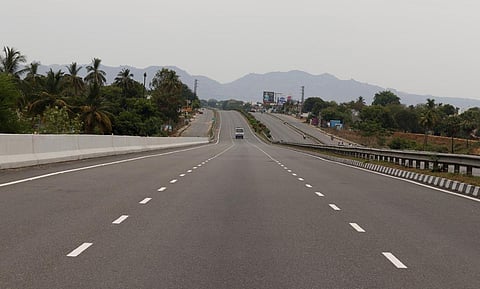Chennai-Bengaluru expressway downgraded due to traffic, alternative road
CHENNAI: The construction of South India’s first greenfield expressway between Chennai and Bengaluru is set to commence within a few months. The National Highways Authority of India (NHAI) planned the project as an eight-lane expressway ever since the preliminary feasibility report was prepared in 2010.
But just months ahead of inviting bids for road construction, the expressway was downgraded to a four-lane stretch. The NHAI attributed the decision to the existing alternative National Highway between the capitals of the two Southern States, and traffic volume.
The existing 326-km Chennai-Bengaluru bypass road handles more than 75,000 vehicles per day, and cannot hold additional traffic. Hence, the eight-lane expressway was proposed to meet the growing industrial demand on the stretch and provide faster connectivity for end-to-end travellers.
The proposed 262-km expressway is intended for vehicles to travel at 120 kmph, and to reduce the travel distance by 50 km. It is to begin at Hoskote in Karnataka and end at Sriperumbudur in Tamil Nadu, passing through Palamaner and V Kota in Andhra Pradesh, and Gudiyattam and Arakkonam in Tamil Nadu.
NHAI-appointed consultants and a few other agencies conducted multiple studies on the feasibility of the project before it was approved by the Centre. The detailed project reports were revised accordingly. The quantum of land needed for the project was estimated for an eight-lane expressway. While 817.60 hectares are required in Karnataka for 72 km of the expressway, 918.52 hectares are required in Andhra Pradesh for 85 km, and 833.91 hectares in Tamil Nadu for 106 km.
The decision to reduce the width of the road was taken considering the traffic and other routes between Bengaluru and Chennai, at a meeting held on May 26 last year in which the member (projects), NHAI, chief general manager (technical), regional office, Bengaluru and other officials participated, said NHAI.
“It proposed to build the four-lane expressway extendable to eight lanes. The same shall be designed in such a way that future widening is feasible without any technical issue,” revealed a copy of an official document obtained by Express through RTI.
The NHAI said the expressway will have a depressed median that enables future widening of the road from the inside. The depressed median will have a width of at least 12 m. “Additional land acquired for the project will be made available in the median. Thus, the road can be widened in future without any land acquisition,” said an official.
An office-bearer of the State Truckers’ Association said expressways on highly-congested routes should have at least six lanes. “As the user fee is going to be high, the NHAI should have planned six lanes. With two lanes on each side, its unsafe to operate vehicles at 100 kmph,” he asserted.

